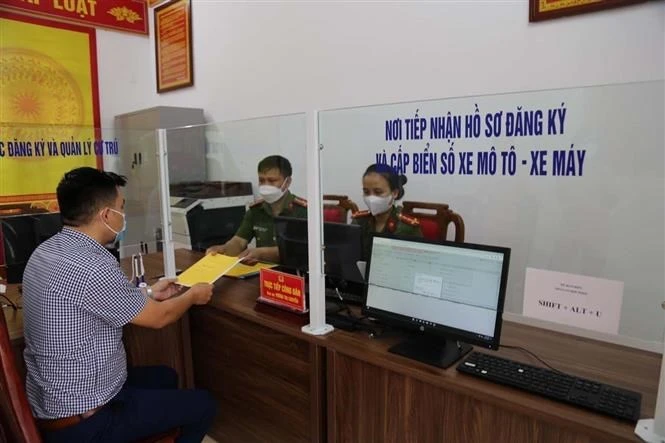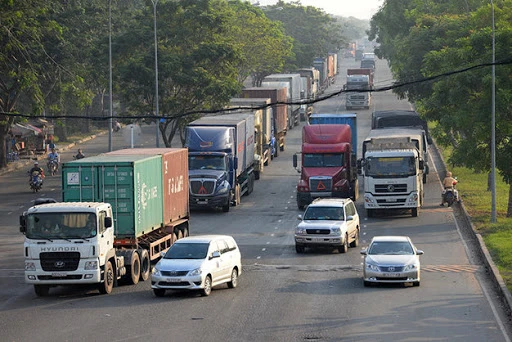


The burden of vehicle registration renewal weighs heavily on transport businesses
According to Circular 58/2020 issued by the Ministry of Public Security, businesses that switched from white plates to yellow plates for commercial vehicles were allowed to retain their registration numbers and continue using their vehicle registration certificates. The plate-changing procedure was relatively simple, and companies did not have to bring their vehicles to the registration office. However, under Circular 79/2024 of the Ministry of Public Security, vehicles with yellow plates must now change their vehicle registration certificates to match the yellow plate format. The frequent changes in vehicle registration regulations for commercial transport have created numerous challenges for businesses.
The new requirement for changing vehicle registration certificates is putting transport businesses in a difficult position. Complicated administrative procedures, prolonged waiting times, and increased costs are major challenges that companies must face. Many businesses, especially small and medium-sized enterprises, lack the resources to comply with these new requirements, leading to congestion at registration offices, business disruptions, and reduced productivity and efficiency. Moreover, the constant changes in vehicle registration laws make it difficult for businesses to adapt, causing instability in their operations.

Mr. Lê expressed concerns that companies with bank loans secured by vehicle registration certificates may not be able to retrieve their documents to complete the registration renewal process. Without the updated registration certificate, vehicle inspection centers may refuse to certify the vehicles, preventing them from operating. The process of changing the registration certificate for vehicles under bank mortgages is particularly complex. Mortgage contracts and insurance documents are all based on the old plate numbers, making the paperwork adjustments cumbersome for businesses.
Under the new process, a vehicle changing its registration certificate must first replace its plate, after which the company must apply for a new transport business license at the Department of Transport before resuming operations. "All these procedures force us to halt vehicle operations for several days, disrupting our business and risking lost orders," said Nguyễn Văn Thành, Director of a transport company in Hanoi.
Additionally, the Road Traffic Safety and Order Law 2024, effective from January 1, 2025, introduces a maximum driving time limit of 48 hours per week, sparking heated debates in the transport and logistics industries. This regulation not only affects drivers' incomes but also reduces transport capacity, leading to increased freight rates, higher logistics costs, and reduced economic competitiveness.
For drivers, cutting working hours to 48 per week could mean a 20–30% reduction in income, significantly impacting their quality of life. For transport companies, the regulation will lower productivity, as the increased transport and rest times for each shipment will drive up costs, potentially raising freight rates by 15–20%.
Decree 168/2024/NĐ-CP also presents challenges for drivers, as stricter penalties for violations may increase stress and anxiety in their daily work. The high fines could demotivate many drivers from continuing their profession.

Beyond the immediate impact, these regulations could lead to serious long-term consequences. The risk of supply chain disruptions will rise due to reduced transport capacity and longer delivery times. To offset increased costs, transport companies may raise freight rates, which will directly impact product and service prices, driving up inflation. Transport businesses will face greater difficulties, reducing their competitiveness against both domestic and foreign competitors. Additionally, the complex administrative procedures could make Vietnam's market less attractive to foreign investors, creating barriers and increasing investment risks.
In this volatile market, WR1, a subsidiary of InterLOG, has been at the forefront of developing comprehensive solutions to help businesses proactively manage supply chain risks. One key recommendation is to minimize risks related to tight delivery deadlines and port cut-off times by scheduling earlier pickup and delivery times. Optimizing warehouse planning can also reduce driver wait times, saving time for other shipments. Additionally, businesses should budget for an expected 15–20% increase in road transport costs.
To thrive, transport businesses must remain flexible and implement timely solutions to adapt to government policy changes, ensuring sustainable growth and competitive advantages in the market.


